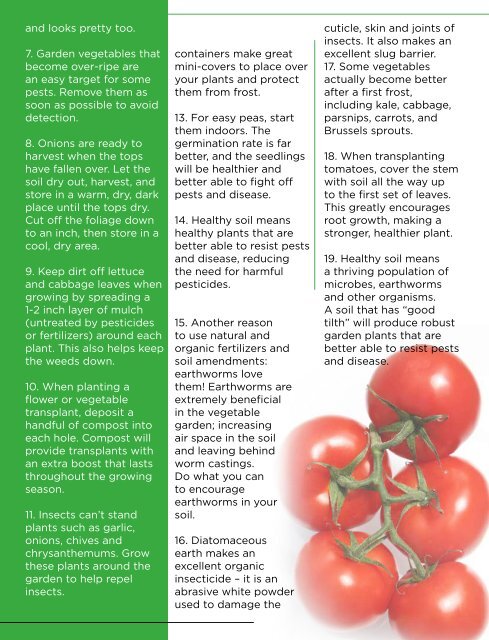04-2018-GL-FINAL
Create successful ePaper yourself
Turn your PDF publications into a flip-book with our unique Google optimized e-Paper software.
and looks pretty too.<br />
7. Garden vegetables that<br />
become over-ripe are<br />
an easy target for some<br />
pests. Remove them as<br />
soon as possible to avoid<br />
detection.<br />
8. Onions are ready to<br />
harvest when the tops<br />
have fallen over. Let the<br />
soil dry out, harvest, and<br />
store in a warm, dry, dark<br />
place until the tops dry.<br />
Cut off the foliage down<br />
to an inch, then store in a<br />
cool, dry area.<br />
9. Keep dirt off lettuce<br />
and cabbage leaves when<br />
growing by spreading a<br />
1-2 inch layer of mulch<br />
(untreated by pesticides<br />
or fertilizers) around each<br />
plant. This also helps keep<br />
the weeds down.<br />
10. When planting a<br />
flower or vegetable<br />
transplant, deposit a<br />
handful of compost into<br />
each hole. Compost will<br />
provide transplants with<br />
an extra boost that lasts<br />
throughout the growing<br />
season.<br />
11. Insects can’t stand<br />
plants such as garlic,<br />
onions, chives and<br />
chrysanthemums. Grow<br />
these plants around the<br />
garden to help repel<br />
insects.<br />
12. Milk jugs, soda<br />
bottles and other plastic<br />
containers make great<br />
mini-covers to place over<br />
your plants and protect<br />
them from frost.<br />
13. For easy peas, start<br />
them indoors. The<br />
germination rate is far<br />
better, and the seedlings<br />
will be healthier and<br />
better able to fight off<br />
pests and disease.<br />
14. Healthy soil means<br />
healthy plants that are<br />
better able to resist pests<br />
and disease, reducing<br />
the need for harmful<br />
pesticides.<br />
15. Another reason<br />
to use natural and<br />
organic fertilizers and<br />
soil amendments:<br />
earthworms love<br />
them! Earthworms are<br />
extremely beneficial<br />
in the vegetable<br />
garden; increasing<br />
air space in the soil<br />
and leaving behind<br />
worm castings.<br />
Do what you can<br />
to encourage<br />
earthworms in your<br />
soil.<br />
16. Diatomaceous<br />
earth makes an<br />
excellent organic<br />
insecticide – it is an<br />
abrasive white powder<br />
used to damage the<br />
cuticle, skin and joints of<br />
insects. It also makes an<br />
excellent slug barrier.<br />
17. Some vegetables<br />
actually become better<br />
after a first frost,<br />
including kale, cabbage,<br />
parsnips, carrots, and<br />
Brussels sprouts.<br />
18. When transplanting<br />
tomatoes, cover the stem<br />
with soil all the way up<br />
to the first set of leaves.<br />
This greatly encourages<br />
root growth, making a<br />
stronger, healthier plant.<br />
19. Healthy soil means<br />
a thriving population of<br />
microbes, earthworms<br />
and other organisms.<br />
A soil that has “good<br />
tilth” will produce robust<br />
garden plants that are<br />
better able to resist pests<br />
and disease.


